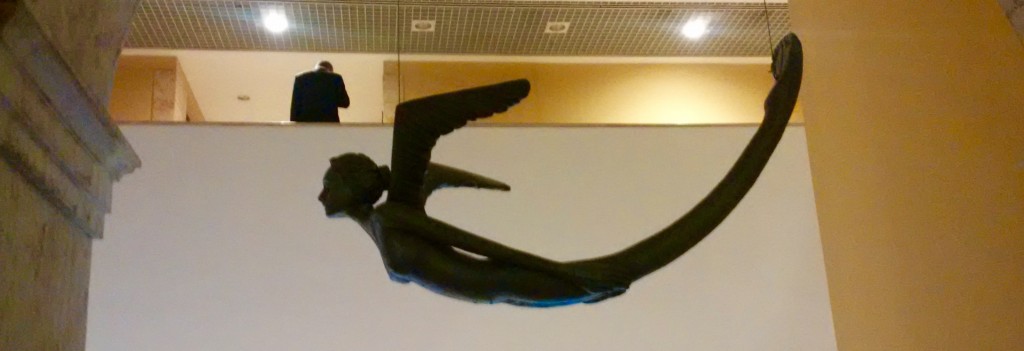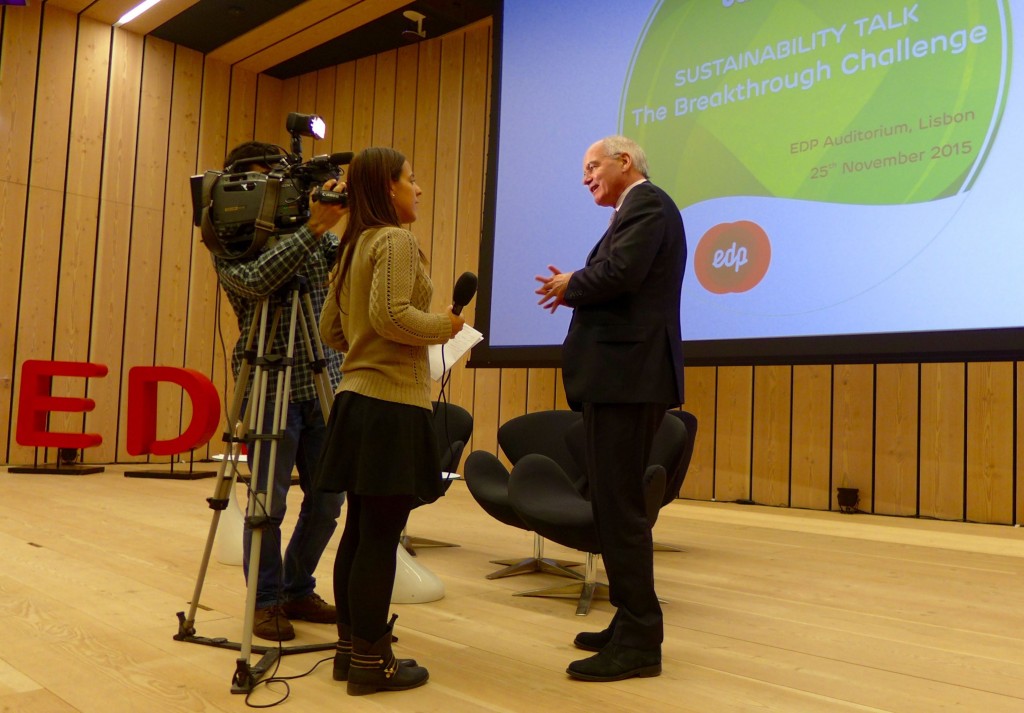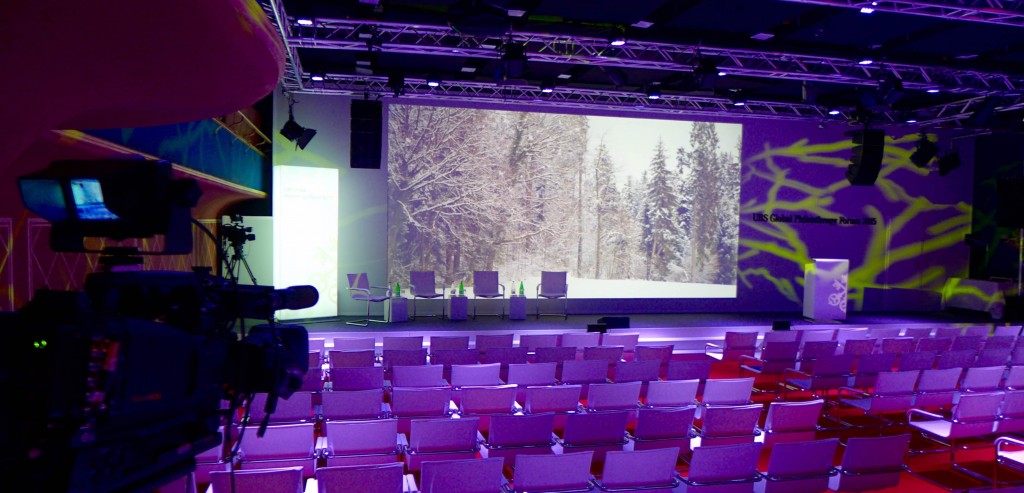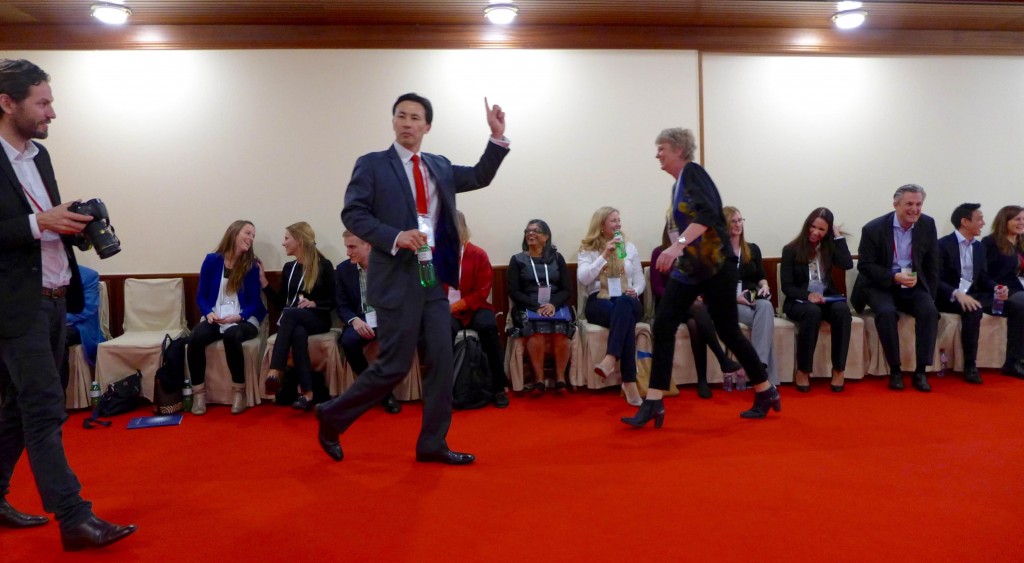



Feeling exhausted, after several pretty intense weeks. They included a trip to Lisbon, for a BCSD (Business Council for Sustainable Development) Portugal event in the Universidad Nova and then a session at the new HQ of the energy utility EDP (24-26 November).
The night I arrived, I was taken out by Fernanda Pargana (General secretary of BCSD Portgal) for a wonderful dinner at the extraordinary Pharmacia restaurant. Spoke alongside Maria Mendiluce (WBCSD Climate & Energy Manager) at both the BCSD Portugal and EDP events, at the first after her, at the second before, so we mixed it up a little.
The theme of the BSCD event was the low carbon economy, particularly appropriate given the imminence of the COP21 climate conference in Paris, which is in full swing as I write this.
Once back from Lisbon, a series of meetings and events followed, including a trip to Hill House to see the family on 28 November, the latest session of the admissions panel of the Social Stock Exchange, great sessions with Sophia Tickle and Becky Buell of Meteos and with Lisa Goldapple and Cathy Runciman of the Atlas of the Future, an evening salon hosted at Volans with some 15 people to hear Jeanne-Marie Gescher read from her new book, All Under Heaven, a fascinating meeting with Peter Wheeler of The Nature Conservancy, a key call with Lise Kingo of the UN Global Compact and a lunch with Jeremy Oppenheim of McKinsey.
Unusually, have slept for perhaps four hours today, as the wind beat about the house. Flew in last night, eventually spending a total of 8 hours travelling from St Moritz to London.
Yesterday morning, I had kicked off the 2015 UBS Global Philanthropy Forum in St Moritz, whose theme this year was ‘Daring to Innovate.’ In the opening session I was directly followed by two wonderful speakers: Jacqueline Novogratz of Acumen and Ashish Thakkar of the Mara Group and Mara Foundation. Then the three of us did a delightful panel session, chaired by Caroline Anstey of UBS.
One of my slides had featured two wide angle pictures, the first of an early Wright Brothers aircraft wobbling into the skies above Kittyhawk, the second an Earthrise picture shot from the Moon. (It had seemed appropriate, given that the conference documentation started off by saying: “Some laughed when Columbus said the world was round. Others said airplanes wouldn’t get off the ground.”)


Then, on Thursday night, I had suddenly woken up to the fact that the time between that image of the Wright Stuff and the first landing on the Moon (represented here by the image of Earthrise, taken by the Anders, Borman and Lovell mission a year earlier, in 1968) was 66 years (1903 through to 1969), so in my speech I linked that to my age, noting that unimaginable, seemingly impossible things can happen inside today’s human lifespan.
I also used three slides featuring Pilar Puig of the Puig perfume and fragrances group, who I had asked a number of questions around how a 22-year-old Millennial sees the sustainability agenda.
But for me, the highlight of the St Moritz trip was one of the parallel events that followed our opening session. It was run by David Begbie of the Crossroads Foundation, based in Hong Kong.
He divided some 40 participants into two groups, the ‘Alphas’ and ‘Betas’. Each was schooled separately in their particular cultures, languages and customs. When they came back together, mutual incomprehension was pretty much guaranteed. Disorienting, at times very funny, and deeply educational.
I was allocated to the Beta group, which was mercantile, with intense trading of different coloured cards, and assiduous keeping of scores. The other group turned out to be more touchy-feely – and constantly asked how one’s father or grandfather was. (A reference to the source of much of the wealth for philanthropists.)
Uniquely in the group, I discovered that I couldn’t play the game. I found my brain totally refusing to learn the trading rules or the linguistic code. Instead, I sat to one side, outside the process, observing the groups form and interact.
Talking it through with David afterwards, I mused that I had often felt an outsider in life and in work, though I was generally comfortable with that. And this has often helped me move between communities of interest without getting totally seduced by the ideologies of any particular group.
I had suspected that this experiential session would be taxing, which is why I signed up for it, but I had no idea of just how challenging I would find it. That said, David described some of the other sessions that they have done, which sound a lot more taxing.
In one, they had UN Secretary-General Ban Ki-moon (and his bodyguard) take part in a particularly intense immersion simulation, where they were in a setting designed to resemble an Afghan house, where participants were welcomed by a local; headman in Afghan.
This man warned that they would have to leave soon, because of impending threats. Promptly there was the sound of helicopters, stun grenades were thrown into the house and uniformed soldiers broke in with guns. Everyone, including the Secretary-General, ended up on the floor. The bodyguard’s hand was not far from his own gun.
… and now back to bed.
